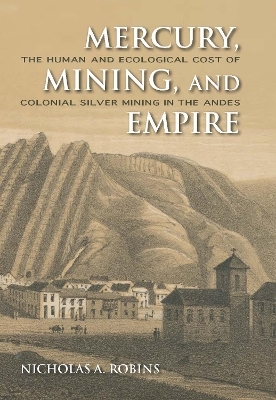
Mercury, Mining, and Empire
The Human and Ecological Cost of Colonial Silver Mining in the Andes
Seiten
2011
Indiana University Press (Verlag)
978-0-253-35651-2 (ISBN)
Indiana University Press (Verlag)
978-0-253-35651-2 (ISBN)
- Lieferbar (Termin unbekannt)
- Versandkostenfrei innerhalb Deutschlands
- Auch auf Rechnung
- Verfügbarkeit in der Filiale vor Ort prüfen
- Artikel merken
Discusses the effects of mercury pollution on the indigenous peoples of Peru and Bolivia
On the basis of an examination of the colonial mercury and silver production processes and related labor systems, Mercury, Mining, and Empire explores the effects of mercury pollution in colonial Huancavelica, Peru, and Potosí, in present-day Bolivia. The book presents a multifaceted and interwoven tale of what colonial exploitation of indigenous peoples and resources left in its wake. It is a socio-ecological history that explores the toxic interrelationships between mercury and silver production, urban environments, and the people who lived and worked in them. Nicholas A. Robins tells the story of how native peoples in the region were conscripted into the noxious ranks of foot soldiers of proto-globalism, and how their fate, and that of their communities, was—and still is—chained to it.
On the basis of an examination of the colonial mercury and silver production processes and related labor systems, Mercury, Mining, and Empire explores the effects of mercury pollution in colonial Huancavelica, Peru, and Potosí, in present-day Bolivia. The book presents a multifaceted and interwoven tale of what colonial exploitation of indigenous peoples and resources left in its wake. It is a socio-ecological history that explores the toxic interrelationships between mercury and silver production, urban environments, and the people who lived and worked in them. Nicholas A. Robins tells the story of how native peoples in the region were conscripted into the noxious ranks of foot soldiers of proto-globalism, and how their fate, and that of their communities, was—and still is—chained to it.
Nicholas A. Robins is a lecturer in the Department of History at North Carolina State University. He is author of Native Insurgencies and the Genocidal Impulse in the Americas (IUP, 2005) and editor (with Adam Jones) of Genocides by the Oppressed: Subaltern Genocide in Theory and Practice (IUP, 2009), among other works.
Preface
Acknowledgments
Introduction
1. Amalgamating an Empire
2. Toxic Travails: Mining in Huancavelica
3. Blood Silver
4. Connecting the Drops: The Wider Human and Environmental Costs
5. From Corrosion to Collapse: The Destruction of Native Communities
Conclusion
Glossary
Notes
Bibliography
Index
| Zusatzinfo | 14 maps |
|---|---|
| Verlagsort | Bloomington, IN |
| Sprache | englisch |
| Maße | 152 x 229 mm |
| Gewicht | 658 g |
| Themenwelt | Geisteswissenschaften ► Geschichte ► Regional- / Ländergeschichte |
| Studium ► Querschnittsbereiche ► Prävention / Gesundheitsförderung | |
| Naturwissenschaften ► Biologie ► Ökologie / Naturschutz | |
| Technik ► Bergbau | |
| ISBN-10 | 0-253-35651-2 / 0253356512 |
| ISBN-13 | 978-0-253-35651-2 / 9780253356512 |
| Zustand | Neuware |
| Haben Sie eine Frage zum Produkt? |
Mehr entdecken
aus dem Bereich
aus dem Bereich
das Manual zur psychologischen Gesundheitsförderung
Buch | Hardcover (2023)
Springer Berlin (Verlag)
39,99 €
Wissenschaftlich basierte Empfehlungen, Tipps und Ernährungspläne für …
Buch (2022)
Thieme (Verlag)
51,00 €
Orthomolekulare Medizin in Prävention, Diagnostik und Therapie
Buch | Hardcover (2022)
Thieme (Verlag)
71,00 €


